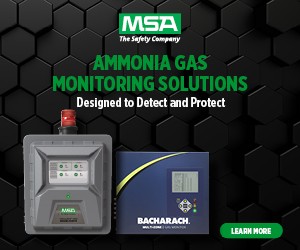IIAR Expands International Outreach with Colombia Visit
“The IIAR, over the past three years, has formed a lot of alliances with international organizations,” said IIAR Chairman Bob Port. “We are really working globally to promote IIAR and to build alliances that promote the safe use of ammonia, CO2 and natural refrigerants.”
“IIAR is becoming recognized more and more around the world as a leader in ammonia refrigeration as far as being a standards-writing body and also developing good information for safety and training for ammonia systems.”
Dave Rule, IIAR President
To help build up those alliances and share knowledge across the industry, IIAR has attended and hosted a wide variety of industry events and conferences at the international level. “This is an important year for us to get out and attend other meetings and learn from each other,” said Port, adding that in many cases, at least one IIAR staff member or board member is attending an industry conference.
At the end of July, IIAR President Dave Rule and IIAR Chair Elect Marcos Braz attended the Spanish Inter American Congress for Air Conditioning and Refrigeration, in Cartagena, Colombia. The conference included a broad focus on environmentally sustainable technology, said Chris Combs, IIAR’s International Programs Director, adding that this is the first time IIAR has been invited to participate in an ACAIRE conference.
“I think it represents the beginning of our relationship with ACAIRE and with Colombia because ACAIRE is a Colombian organization” said Combs. “I’m hoping that it will help us serve members of the industry in Colombia better; hopefully gain more members and more interest in what we do.” Combs added that individuals throughout Latin America, Spain, Portugal, and Europe attended the conference. “It will, I think, give us some good exposure in the entire Ibero-American region.”
Both Rule and Braz gave presentations at the conference. Braz, who served as the primary speaker for the event, walked attendees through the design, build, and operations of a meat processing plant from an engineering standpoint. He also spoke about low-charge ammonia package refrigeration systems.
During the opening speech, Rule spoke about the benefits of ammonia and other natural refrigerants as environmentally safe refrigerants and as a resource that can be used to expand the worldwide cold chain.
In a speech entitled, “Moving Towards a Greener Planet with Natural Refrigerants,” Rule spoke about global warming challenges and the need to accelerate the use of technologies that do not contribute to global warming. He said his speech focused on ammonia and other natural refrigerants as the most practical and efficient refrigerants available to meet the challenges within the global cold chain.
Later, he spoke about the work IIAR does in developing proper operating standards and guidelines, especially IIAR’s Ammonia Refrigeration Management Program, or ARM, manual, to ensure the safe and efficient application of ammonia around the world. He also outlined the preparation and training that is recommended for the first 30 minutes of response time in the event of an ammonia release. That program is based on the Ammonia Safety Training Institute, or ASTI, recommendations.
Called, “Developing Safety Guidelines for Your Facility: Prevention and Response Planning,” the speech was meant to highlight that safety is the most important goal of the industrial refrigeration industry. The point of the speech was to convey that “every facility that uses ammonia should have a safety program that addresses prevention as well as emergency response,” said Rule.
“IIAR is becoming recognized more and more around the world as a leader in ammonia refrigeration, as far as being a standards-writing body, and also developing good information for safety and training for ammonia systems,” said Rule. “The whole intent is really to try to get our information out there and make sure that we are a resource for other countries that are working to follow good operating standards and procedures.”











